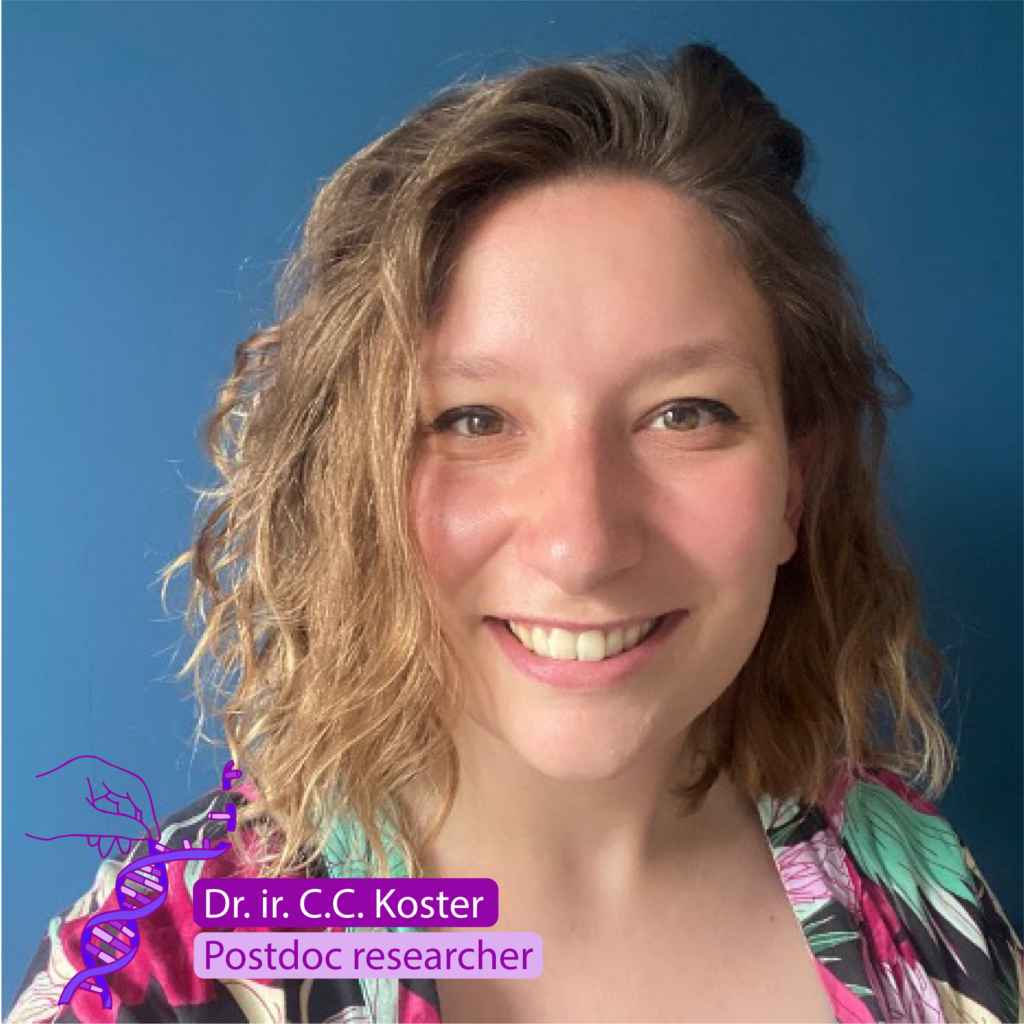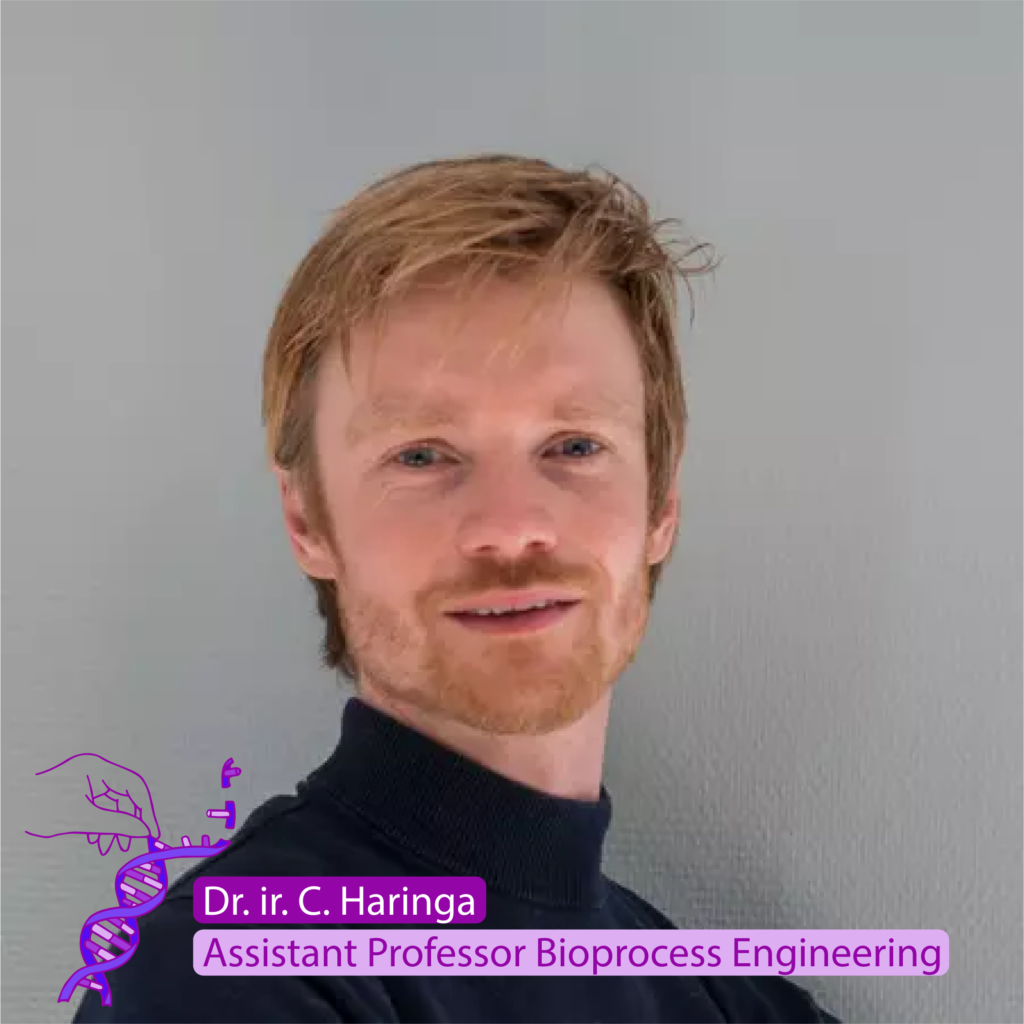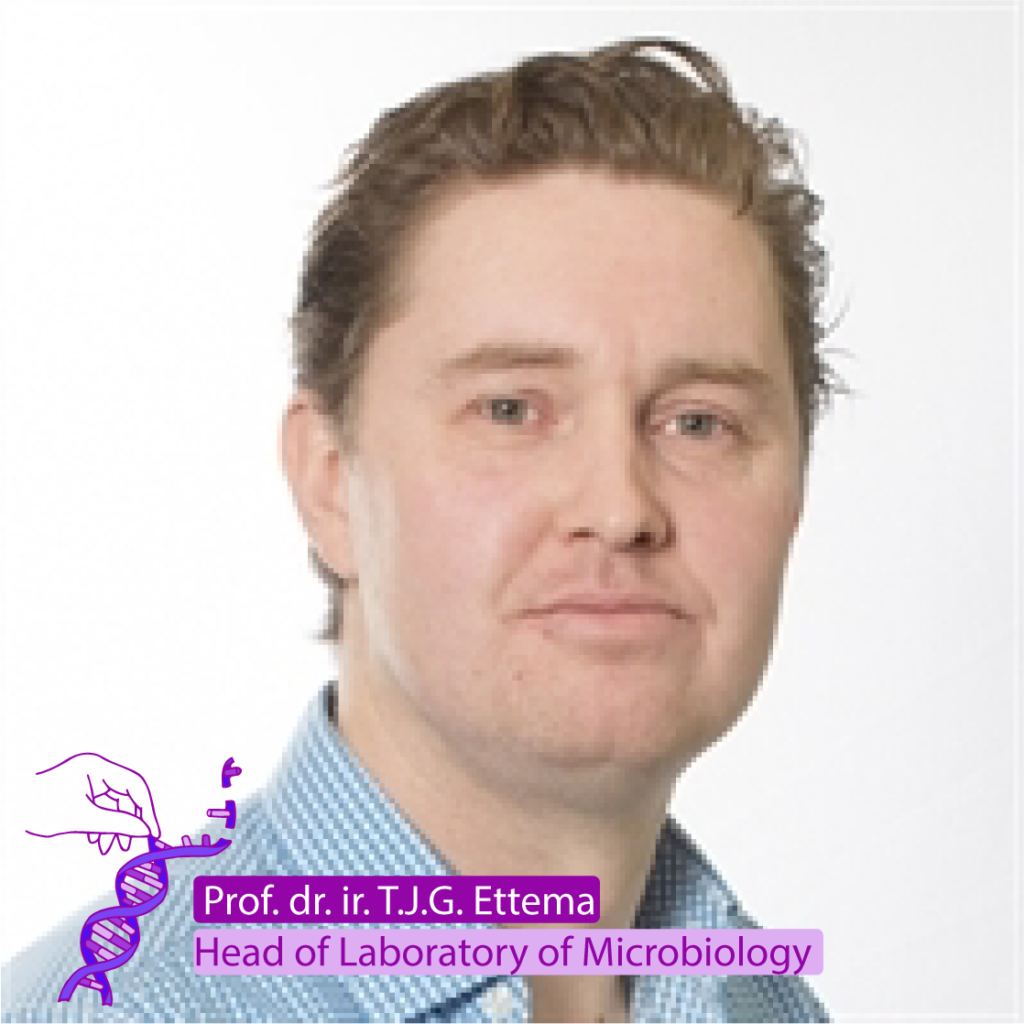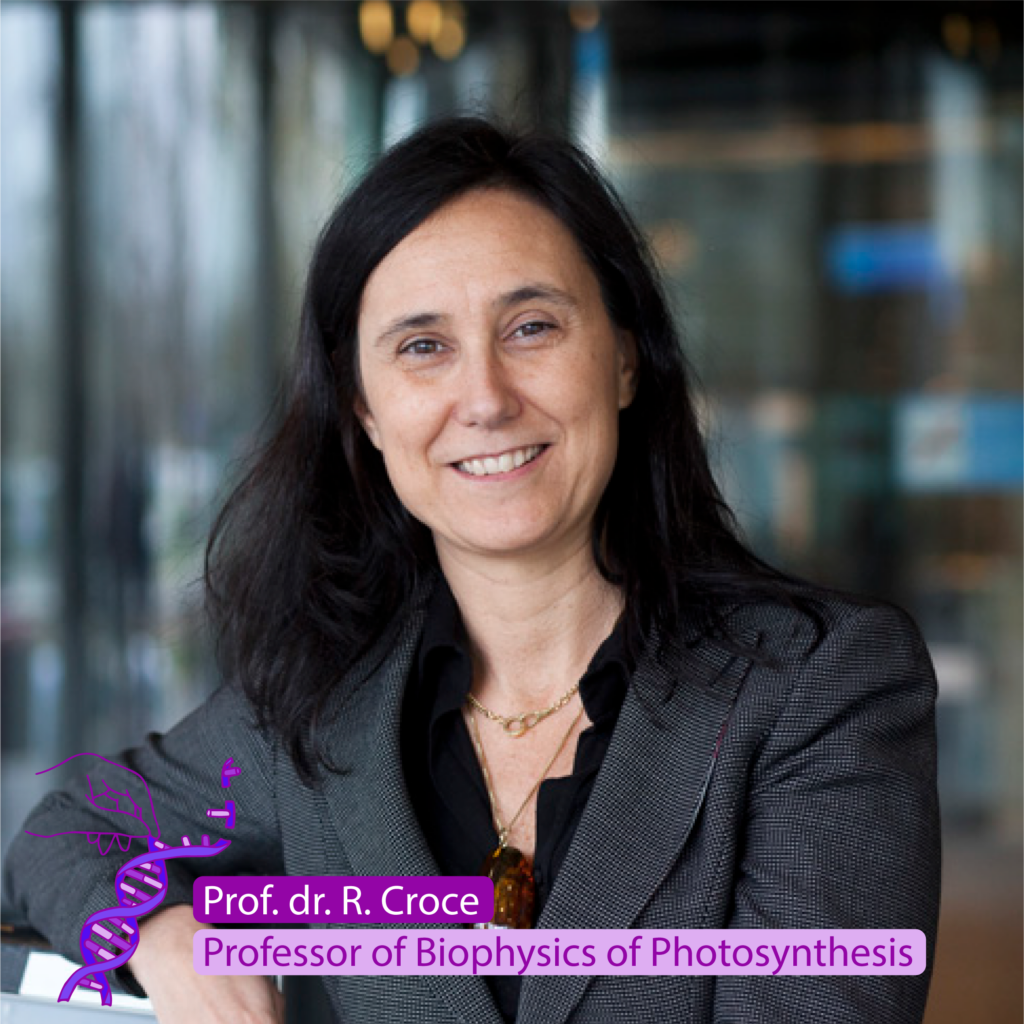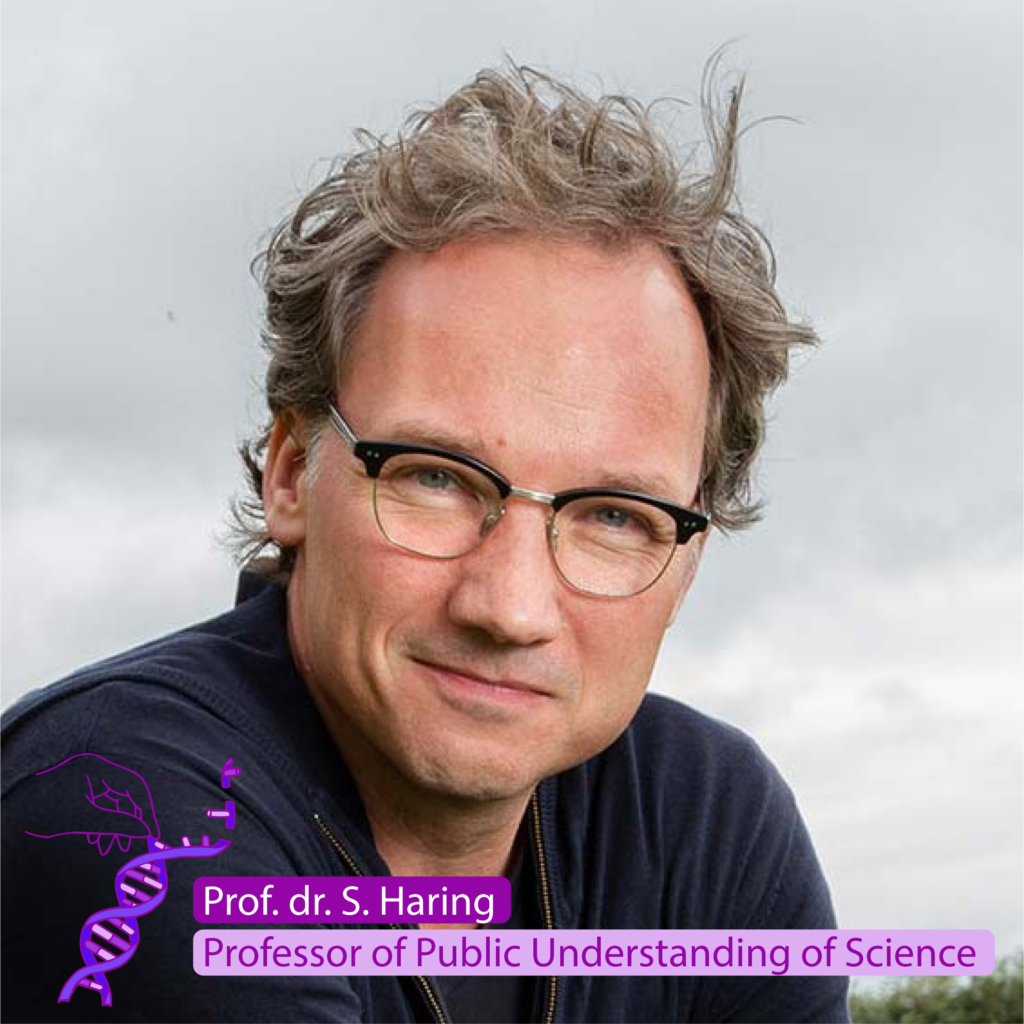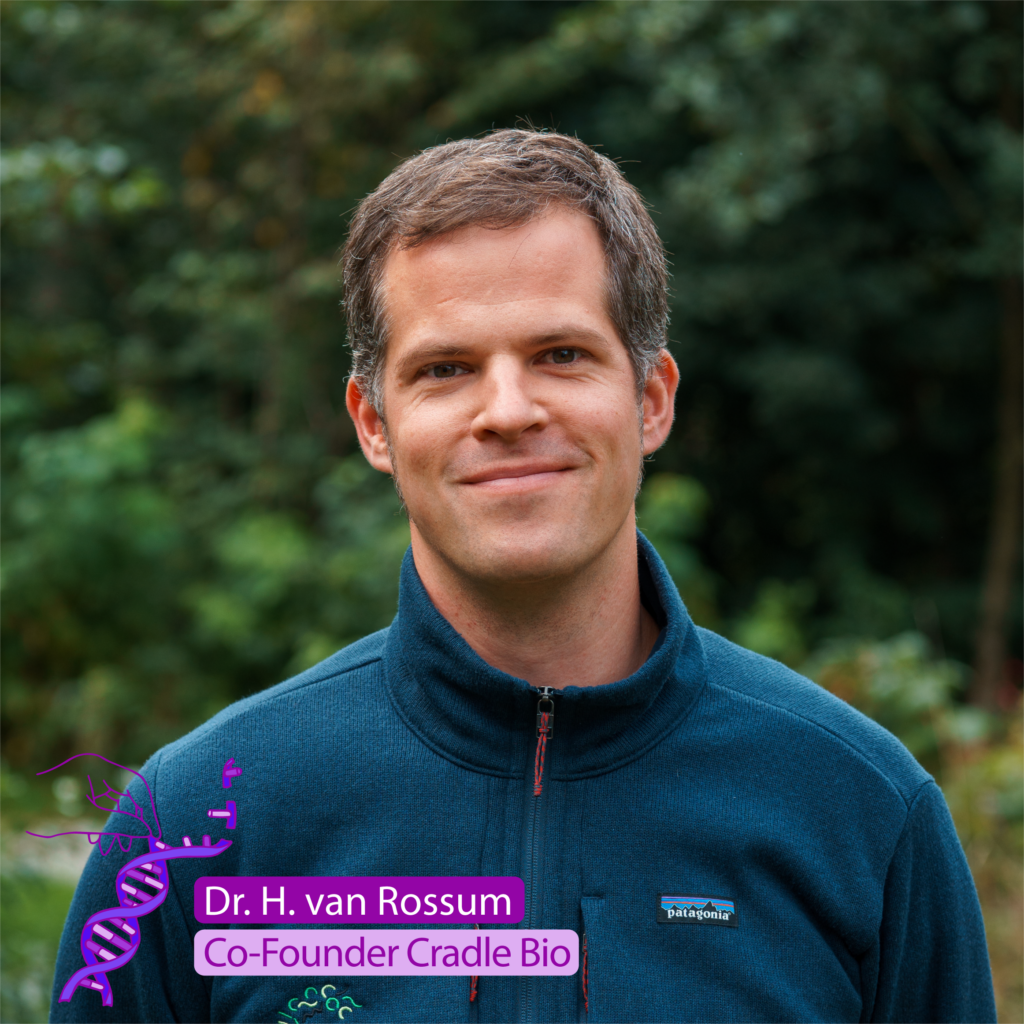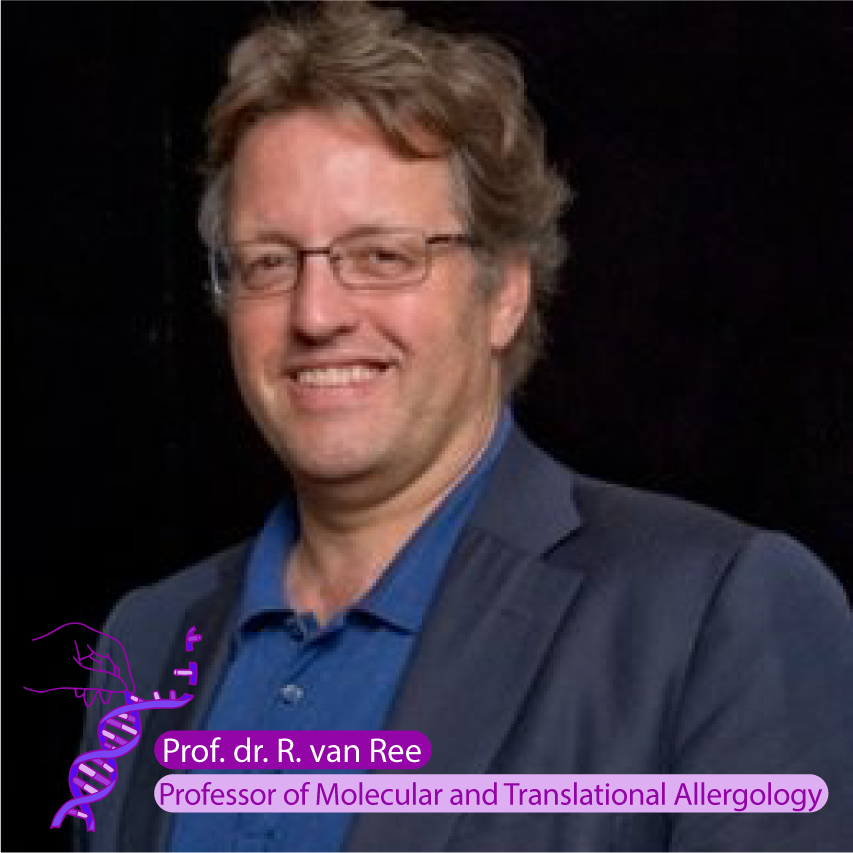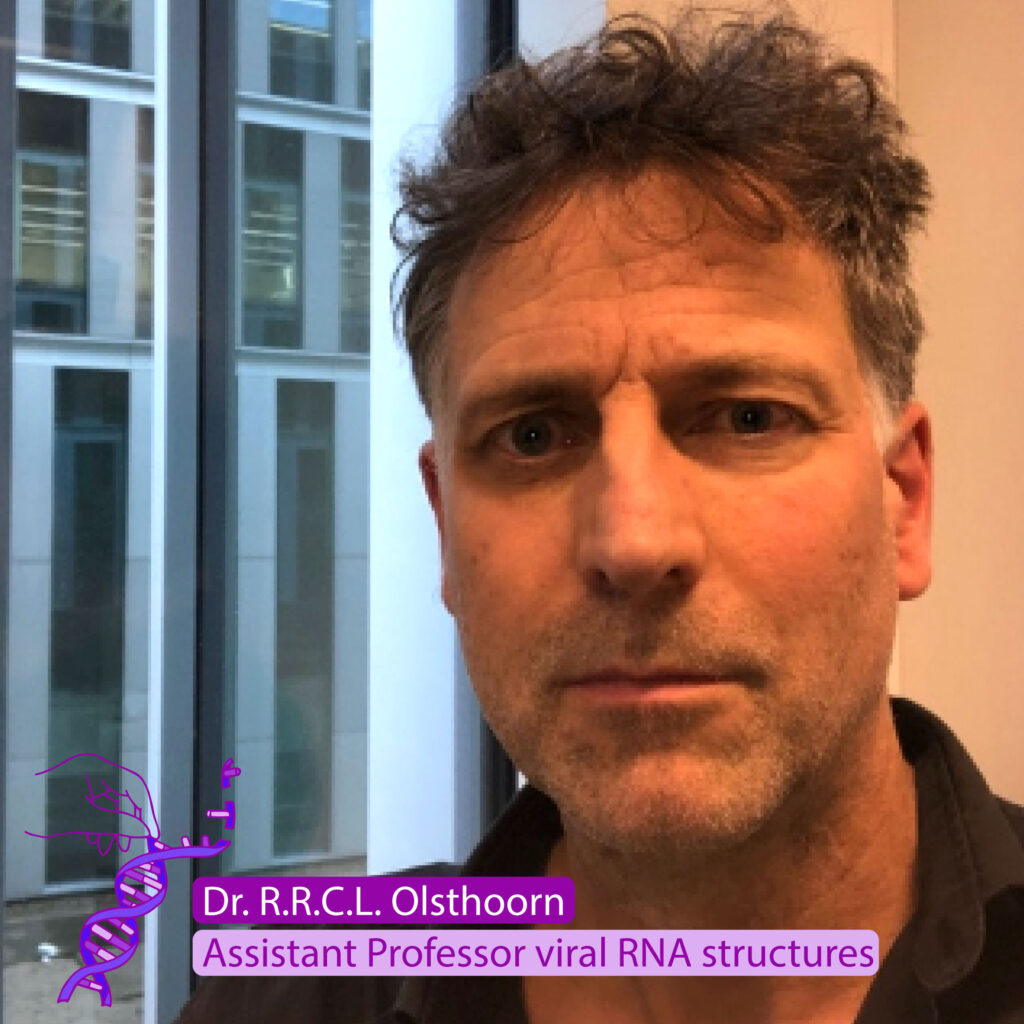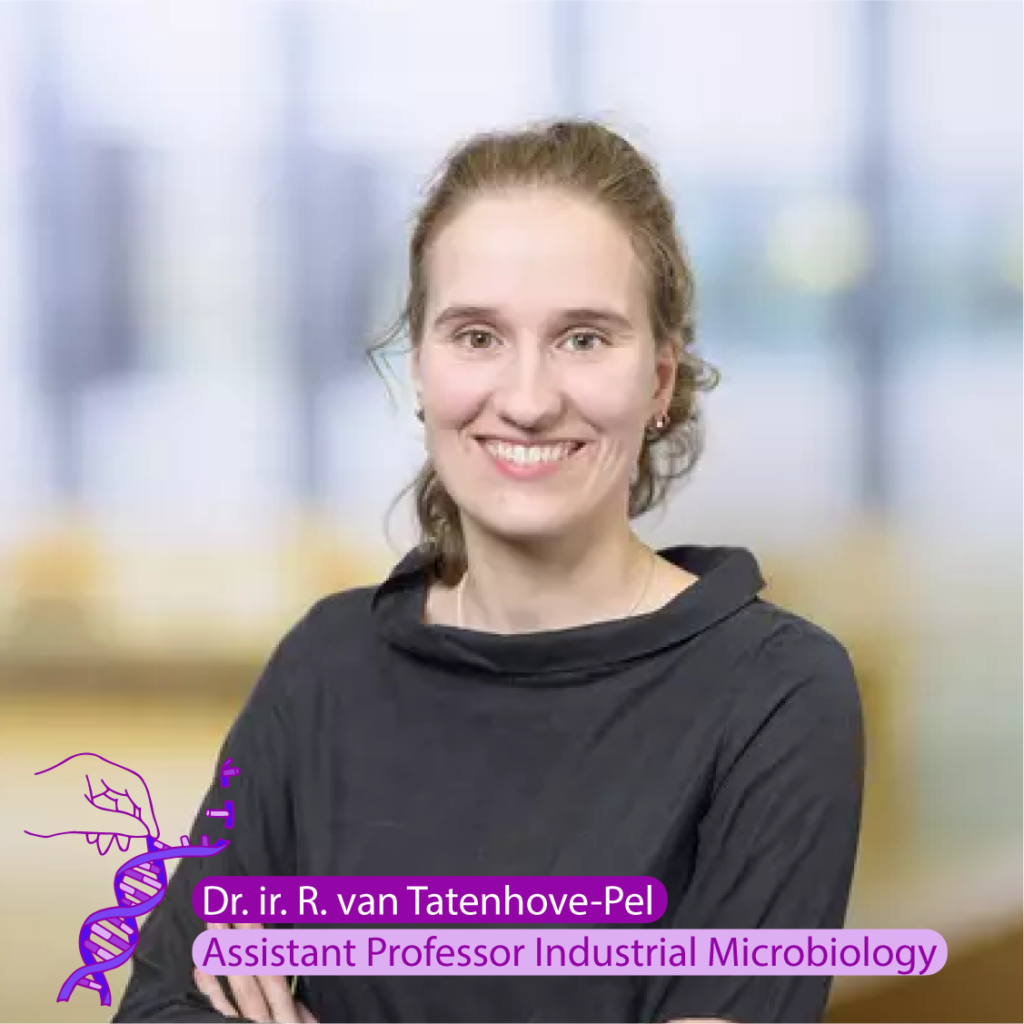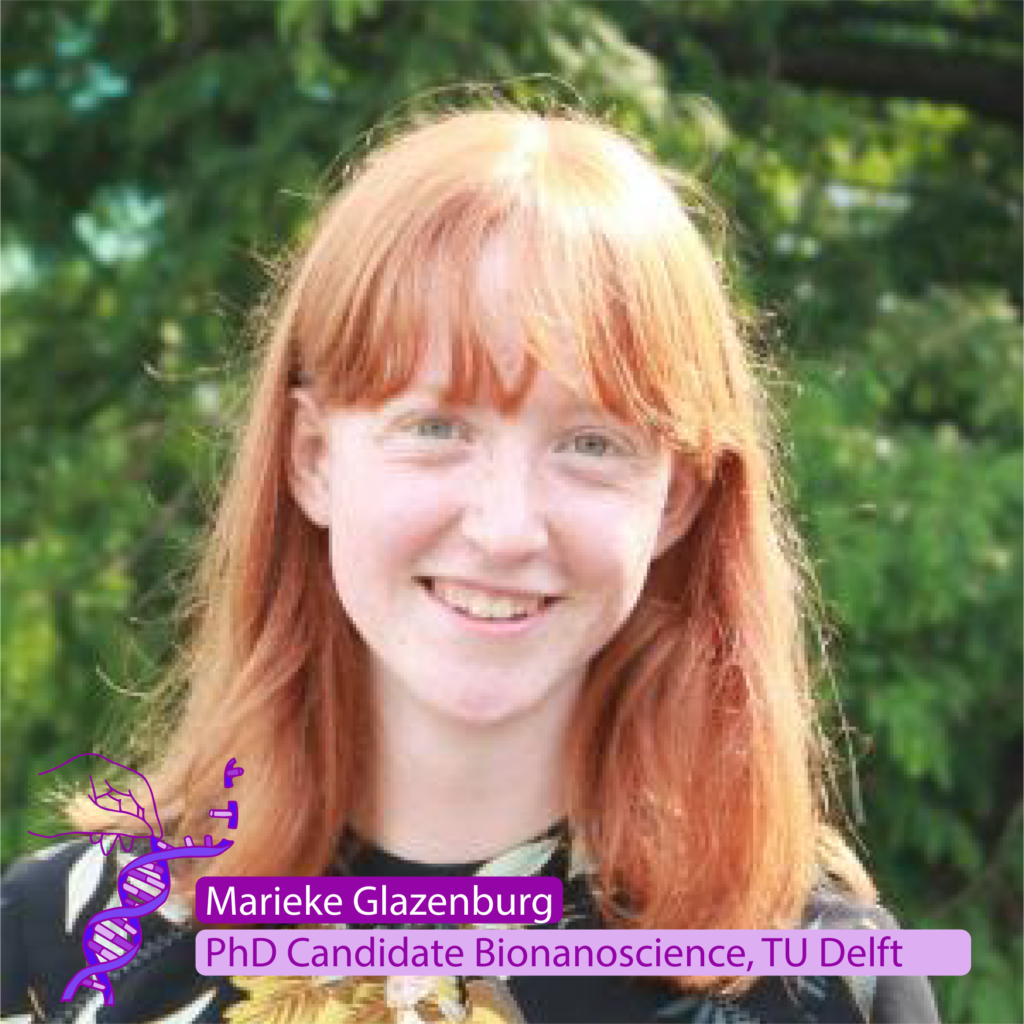Co-chair: Dr. ir. Charlotte Koster:
Dr. ir. Charlotte Koster holds a MSc. degree in Life Science & Technology from Delft University of Technology, and some may even recognize her as president of the 17th board of S.A. LIFE. Charlotte obtained her PhD degree at the Industrial Microbiology group of TU Delft in 2023, where she performed her research within the national Building a Synthetic Cell (BaSyC) consortium and focused on studying the minimal yeast mitochondrial genome and transcriptome as an inspiration for designing synthetic cells. She is currently a postdoctoral researcher in the Bacterial Genetics group of the laboratory of Microbiology at Wageningen University & Research, studying the genetic factors that govern protein expression levels. Charlotte is also a board member of the Dutch national synthetic biology association SynBioNL.
Co-chair: Dr. ir. Cees Haringa
Dr. ir. Cees Haringa holds a BSc and MSc degree from TU Delft in chemical engineering. These were followed by a PhD (with honors) on CFD simulation of industrial fermentation systems, for which he was awarded the inaugural DECHEMA industrial bioprocess award. He worked as a CFD scientist in the DSM biotechnology center from 2017-2020, applying the knowledge he acquired in his PhD in industrial practice. Since 2021, he is working as an assistant professor in the bioprocess engineering group at TU Delft. His goal is to create a sustainable process industry.
Prof. dr. ir. Thijs Ettema
Thijs J. G. Ettema is an evolutionary microbiologist at Wageningen University where he heads the Laboratory of Microbiology. His research focuses on the exploration of microbial diversity with next-generation genomics and various cultivation approaches. He received his PhD at Wageningen University in 2005. After a brief postdoctoral stay at the Radboud University in Nijmegen, he moved to Uppsala University (Sweden) in 2006, where he was appointed as associate professor at the Department of Cell and Molecular Biology in 2014. In 2019, he was appointed as chair professor at Wageningen University. His research group has a broad research focus and works on a variety of scientific questions connected to microbial diversity and evolution that cover all Domains of Life, as well as viruses. One overarching theme in his research involves studying evolutionary transitions, including the origin of complex cells types (eukaryotes). His research group discovered a new group of archaea, the Asgard archaea, providing new, compelling evidence that complex cellular life evolved from an archaeal ancestor that already contained several eukaryotic traits. Thijs Ettema is the recipient of the 2007 Kluyver award by the Royal Dutch Society for Microbiology, he was named ‘Future Research Leader’ by the Swedish Foundation for Strategic Research in 2012, and was elected EMBO Young Investigator by the European Molecular Biology Organization in 2016. His research is, amongst others, funded by the European Research Council.
Prof. dr. Roberta Croce
Prof. Dr. Roberta Croce studied chemistry at the University of Padova and completed her Ph.D. in Plant Biology/Biophysics at the University of Milano in 1998. After two postdoc periods in Germany (MPI Mulheim a.d. Rurh) and Italy (University of Verona), she got a permanent position at the Institute of Biophysics of the CNR first in Milan and then in Trento. In 2005 she moved to the Netherlands at Wageningen University with a visitor fellowship and in 2006 she got a tenure track assistant professor position (Rosalind Franklin fellowship) at the University of Groningen where she became associate professor in 2008. Since 2011 she is Professor of Biophysics of Photosynthesis and head of the group at the Department of Physics of the Vrije Universiteit in Amsterdam. She is an elected member of the Royal Netherlands Academy of Arts and Sciences (KNAW) and the Royal Holland Society of Science and Humanity (KHMW). She is also a member of the Board of Reviewing Editors of Science and the Plant Cell, and the recipient of several personal research grants. She has published more than 180 scientific articles on the topic of photosynthesis. She is currently the elected president of the International Society of Photosynthesis.
Prof. dr. Bas Haring
Bas Haring studied at Utrecht University, where he obtained his propaedeutic degree in physics in 1988 and his doctoral degree in Cognitive Artificial Intelligence in 1992. In 1997 he obtained his PhD in artificial intelligence.Currently Bas Haring is professor of Public Understanding of Science and founder of the master’s programme in media technology at LIACS. He also gives several lectures, including bioethics, scientific narration and visualisation on explaining science through images and stories and on being a scientist on the essence of science and scientific integrity. In addition to his academic roles, he is the author of several books, such as “Kaas & de Evolutietheorie”. He will talk on the subject of evolution and science communication.
Dr. Harmen van Rossum
Harmen van Rossum pursued a Bachelor of Sciences degree in Chemistry at Utrecht University from 2005 to 2010. Building upon his undergraduate studies, Van Rossum then pursued a Master of Sciences (with honors) in Biomolecular Sciences at Utrecht University from 2009 to 2011. From 2008 to 2014, Van Rossum was the owner of Vaccae. He received a PhD in metabolic engineering at TU Delft in 2015. Van Rossum then went on to work in microbe engineering at Zymergen until 2019, and afterwards DSM as a researcher and Tech Lead until 2021. In 2021, van Rossum co-founded Cradle Bio, where he now works as a bioengineer.
Prof. dr. Ronald van Ree
Ronald van Ree was educated in biochemistry and immunology and defended his thesis at the University of Amsterdam in 1994 on the topic of grass pollen allergens and their interaction with the immune system. From 1994 until 2005 he headed the Allergy Research Laboratory at Sanquin Blood Supply Foundation in Amsterdam. In July 2005 he moved to the Academic Medical Center in Amsterdam where he was appointed as Associate Professor at the Department of Experimental Immunology. There he is head of the Laboratory for Allergy Research. In June 2009 Ronald van Ree was appointed as Full Professor of Molecular and Translational Allergology. Ronald van Ree is past (2013-2015) Vice-President of Congresses in the Board of Officers of the European Academy of Allergy and Clinical Immunology (EAACI). He is Section Editor for Food Allergy at Frontiers in Allergy. Ronald van Ree chairs the Scientific Advisory Boards of HAL Alllergy BV and of Angany Inc.
Dr. Rene Olsthoorn
René Olsthoorn studied chemistry at Leiden University, and obtained his PhD degree (cum laude) in the group of Dr. J. van Duin in 1996. His thesis “Evolution and structure of RNA phages” was awarded with the C.J.-Kok prize by the Faculty of Science of Leiden University. From 1996 to 2003 he fulfilled many postdoctoral positions, a.o. in the labs of prof. J.J. Bujarski (Northern Illinois University), prof. C.W.A. Pleij (LU) and prof. J.F. Bol (LU), where he worked on RNA viruses of plants. In 2003 he received the first Beijerinck-Premium from the Royal Netherlands Academy of Arts and Sciences (KNAW) for his contribution to the field of virology. In the same year, he was awarded a VIDI-grant from NWO to continue his studies on viral RNA structures. Currently, he is an Assistant Professor and staff member in the Leiden Institute of Chemistry.
Dr. ir. Rinke van Tatenhove-Pel
Rinke van Tatenhove-Pel studied Life Science and Technology here in Delft and finished her Masters Cum Laude with an internship at NIZO Food Research and a master’s thesis at the department of Biotechnology, in the Environmental Biotechnology group. She then went on to get a PhD at the VU in 2020. Currently Van Tatenhove-Pel is an assistant professor at the TU Delft and has her own group at the Department of Biotechnology, Industrial Microbiology Section. Van Tatenhove-Pel is mainly interested in interactions between cells, strains and species, and the development of high-throughput screening and selection systems. Her research combines defined synthetic consortia, predictive models and laboratory experiments, to gain knowledge and insight that can be used to improve biotechnological processes.
Marieke Glazenburg
Glazenburg pursued her Bachelors and Masters at Radboud University in Physics and Astronomy, with a specialization in Science and Society. After finishing her Masters in 2021, she started a PhD at TU Delft. Glazenburg is currently a PhD candidate in the research group of Dr. Liedewij Laan at the Bionanoscience Department. She conducts research in the emerging field of ‘Cell Biophysics.’ Her research focuses on the formation of polarity in yeasts. She will be speaking about her research in biophysics.

